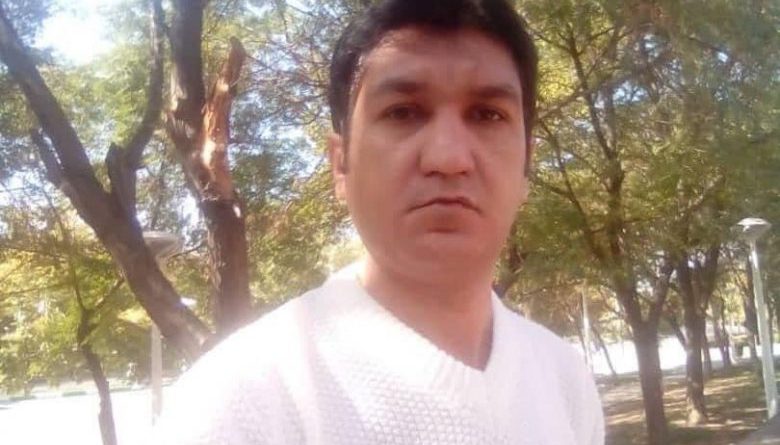Iran’s regime arrests another Ahwazi journalist for the ‘crime’ of exposing its criminality
by Rahim Hamid and Irina Tsukerman
Iranian regime maintains silence through terror, ruthlessly targeting those who speak out for freedom and preserving a climate of constant fear and mistrust
Ahwazi human rights groups have reported the arrest of an Ahwazi journalist, 38-year-old Fouad Albofteleh Nejat, on Friday, 14 August, by Iranian security and intelligence agents.
According to Khakzadegan telegram channel, Fouad, from Koy Ramadan district of the regional capital, Ahwaz, has worked for a number of local publications in the Ahwaz region, being targeted by the regime previously for his exposes of regime corruption and brutality towards the Ahwazi people. In 2008, he was dismissed from a reporter’s job for writing articles exposing the regime’s embezzlement and deliberate underdevelopment of Ahwaz, along with its brutal oppression and racism towards the Ahwazi people. In 2014, he was detained by regime forces for writing articles critical of the regime, and subjected to torture in one of the regime’s infamous ‘black site’ prisons and in the notorious Evin Prison in Tehran, supposedly on charges of ‘threatening national security’, a charge commonly levelled against dissidents.
Fouad spent four months in Evin Prison before being released on bail, with his family reporting that while he’d been healthy before his imprisonment, the mental and physical torture to which he was subjected during his incarceration had left him with multiple medical problems, including seizures and panic attacks. He also began using sedatives and regularly visited a psychiatrist for help with the trauma which he suffered from as a result of the torture.
Speaking on condition of anonymity due to well-founded fear of being targeted, a family member said that although Fouad had been a happy-go-lucky person previously, he had frequently broken down in tears following his imprisonment, saying, “They broke my dignity and humiliated me.”
Fouad’s family are desperately worried for his safety following the latest arrest, with regime officials refusing to give them any information about his location or wellbeing. They have expressed grave concern that this already traumatised man will face further torture and physical and verbal abuse, worsening his already fragile health.
The International Organisation for Human Rights and Freedom of Expression has ranked Iran as one of the world’s top five worst states for abuse of prisoners. The annual report of Reporters Without Borders on freedom of the press and protection of journalists’ rights around the world consistently includes Iran in the top five worst nations globally for the number of journalists arrested per capita. Ahwazi journalists face even worse conditions than their ethnically Iranian counterparts, with ethnically Persian journalists at least allowed a limited degree of freedom of expression; even this restricted degree of freedom is wholly absent for Ahwazis who are effectively treated as to second-class citizens due to their Ahwazi ethnicity, with any activism or journalism criticising the regime’s policies inevitably resulting in persecution, imprisonment, torture, and often execution.
Many journalists and writers survive this systemic injustice and by either going into other professions or simply agreeing to toe the regime line, remaining silent on the regime’s crimes and repeating Tehran’s narrative in an effort to avoid persecution for themselves and their families.
Others, like Fouad, courageously speak out and insist on retaining their journalistic integrity, despite the terrible price which the regime exacts for this principled commitment to truth. The total number of Ahwazi journalists, writers, photographers, poets and others imprisoned, tortured, ‘disappeared’ or executed by the regime for speaking truth to power may never be known.
A freelance journalist in Ahwaz, whose name is withheld here to protect him, said, “As a journalist, there’s no real journalism being done in Ahwaz now. The ‘news’ is confined to producing whatever reports the regime wants, repeating its data, reiterating what its officials say, and the only commentary allowed for its actions is praise. It’s not journalism, it’s stenography – I studied journalism and media studies, this is nothing to do with that. But I have no alternative but to obey orders – I have a family to care for. When I write about the daily oppression, the discrimination against Ahwazis, I have to send it out to fellow Ahwazi journalists in exile, to publish it under an assumed name. I am constantly scared – we’re prisoners in a country that’s one of the most repressive in the world for journalists and media workers – every Ahwazi media activist who’s spoken out has paid the price for it.”
Like all totalitarian states, the Iranian regime maintains silence through terror, ruthlessly targeting those who speak out for freedom and preserving a climate of constant fear and mistrust. For the regime, everything, no matter how innocuous, is perceived through the lens of state security, which is used to justify Orwellian repression against even coded criticism and to crack down brutally on outspoken critics, such as poets, teachers, writers, and journalists. In recent years, the already oppressed people of the Ahwaz region – one of the most deprived on earth despite holding about 95 per cent of Iran’s oil and gas reserved – have faced additional brutality as the leadership in Tehran launches more crackdowns against journalists, photographers, bloggers and anyone else who might expose the regime’s crimes.
As public anger grows at deteriorating living conditions, economic collapse and environmental catastrophe caused by years of deliberate regime neglect, even the usual draconian repression is increasingly inadequate to quell protests, even as the regime escalates the rate of executions, already the second-highest per capita globally after China’s.
The regime is increasingly alarmed at the long-concealed truth about its repression of the Ahwazis reaching the outside world as it attempts to polish its image to win acceptance by the international community. This has resulted in an increase in the targeting of Ahwazi dissidents in Europe and elsewhere, as well as persecuting journalists like Fouad Albofteleh Nejat; for Ahwazis simply speaking the truth is a ‘crime’ Iran’s regime cannot bear.
There are several cases of Ahwazi journalists who were unjustly arrested and jailed by the Iranian authorities in recent years. Some striking examples include the cases of Naim Hamidi and Sayed Nashan Al-Boshawka. Both journalists wrote articles criticising the performance of the education directorate in Ahwaz, condemning the terrible conditions and low quality of education in regional schools compared to other regions in Iran, and censuring the education ministry’s openly racist and discriminatory recruitment policies. These policies, see highly qualified Ahwazi teachers deliberately rejected in favour of less qualified, ethnically Persian teaching personnel. Following the controversy that broke out after the appearance of these pieces, the two journalists were summoned and detained by Iranian Intelligence services in 2018 and released on condition of not writing anything related to Ahwaz.
The list of such cases is lengthy. Mohammad Hassan Fallahieh, an Ahwazi journalist with the Arabic-language service of the public radio and TV broadcaster Al-Alam, was arrested in November 2006. He was tried by a revolutionary tribunal on a charge of spying and was sentenced to three years in prison. After serving his sentence, he had to escape the country and take refuge from UNHCR in Turkey and then came to the USA.
Another journalist who met the same fate was Yousef Azizi Bani Torof, an Ahwazi rights activist and writer and freelance journalist and former member of the Association of Iran’s Writers, who has translated many works from Arabic to Persian. On 25 April 2005, he was arrested at his home by security forces in connection with the Ahwazi popular uprising earlier that month and held at Evin Prison with other Iranian journalists and dissidents. He was released on 28 June 2005. In August 2008, he was condemned to five years in prison. While appealing the decision, he fled Iran and gained political asylum in the United Kingdom.
Ali Badri, an Ahwazi human rights activist and blogger, was arrested in 2011. He was writing in his own blog called Shataljarh on the cultural and civil issues of Ahwazis when he was fired from his job. After being released on bail, he got out of the country taking refuge in UNHCR in Turkey and eventually immigrated to Canada.
These cases are but a small sample of the systematic oppression and persecution of Ahwazi reporters and writers, who dare to uncover and address the issues related to the violation of Ahwazi human rights by the authorities or who criticise the Iranian government in any way. While other journalists throughout the country are frequently imprisoned and jailed for work deemed to be threatening to the regime, Ahwazi journalists face dual oppression and discrimination on the basis of their ethnic identity and as a result of focusing on Ahwazi cultural interests and other relevant identity issues, deemed taboo by the regime which seeks to impose a monolithic “Persian” identity on all of the residents, and to erase historic ties to the land and natural resources by non-Persian nations.
It is an economic policy at least as much as it is an ideologically hateful approach, part, and parcel to Khomeinism. Ahwazis have resided in the relevant territories for thousands of years; their lands contain water resources, gas and oil, which is the backbone of the regime’s economic survival. Acknowledging Ahwazi claims to the land would mean being stymied from pursuit of lucrative opportunities central to the regime’s self-preservation, such as the recently concluded a deal with China, which leases the oil field to Beijing for the next 25% and results to closer defence and security cooperation, particularly against Western countries.
The litany of arrests, abuses of the judicial process, and torture against Ahwazi writers, thinkers, human rights defenders, and journalists is long and precedes. However, the oppression has grown far worse under the Khomeinists. Since the installation of the Islamic Republic, Ahwazi journalists were subjected to unlawful arrests and baseless persecutions. Many have consequently described their experiences and suffered the after-effects of torture.
The international community has been strangely silent about the proliferation of such cases or failed to identify such cases as “Ahwazi”, perhaps as a result of pressure and disinformation by Iranian propagandists. More recently, Ahwazi human rights activism and efforts to shed light on the suppression of unique Ahwazi identity gained momentum in Europe and North America; however, major human rights organisations and activists are overall still mum on this issue. Despite recent criticism of the UN Special Rapporteur Agnes Callamard, who had promised to look into free speech issues related to Ahwazis following blistering rebukes, she continues to stay silent on the subject, instead focusing her expertise and resources on the support of questionable claims and technically poorly sourced reports of phone hacking by well-known public figures such as Jeff Bezos, who have little reason to fear or to claim harassment, especially in comparison to powerless dissidents and columnists held hostage by the regime’s policies in Iran.
Perhaps those who have spent the past couple of years obsessing about various unscrupulous political operatives masquerading as free press mascots, could spare a modicum of the resources devoted to that fruitless topic for more deserving candidates. Perhaps they could finally provide the much-needed assistance to the people with a record of peaceful human rights activities, who continue to suffer systematic persecution and are still in a position to be helped today.
Article first published on Dur Untash Studies Center.
Rahim Hamid is an Ahwazi author, freelance journalist and human rights advocate. He tweets under @Samireza42.
Irina Tsukerman is a New-York based Human Rights Lawyer, National Security Analyst. She can be followed under @irinatsukerman.



